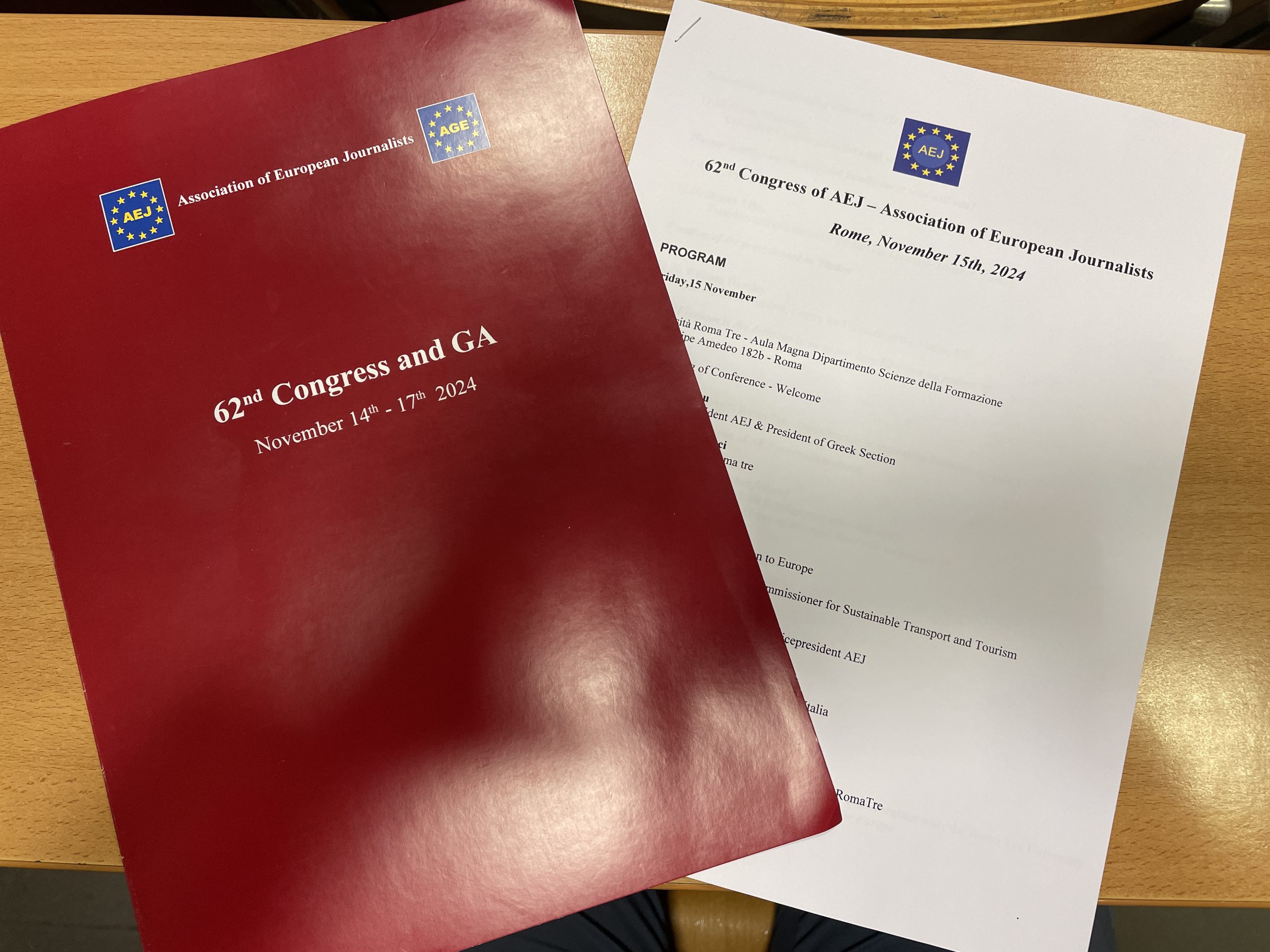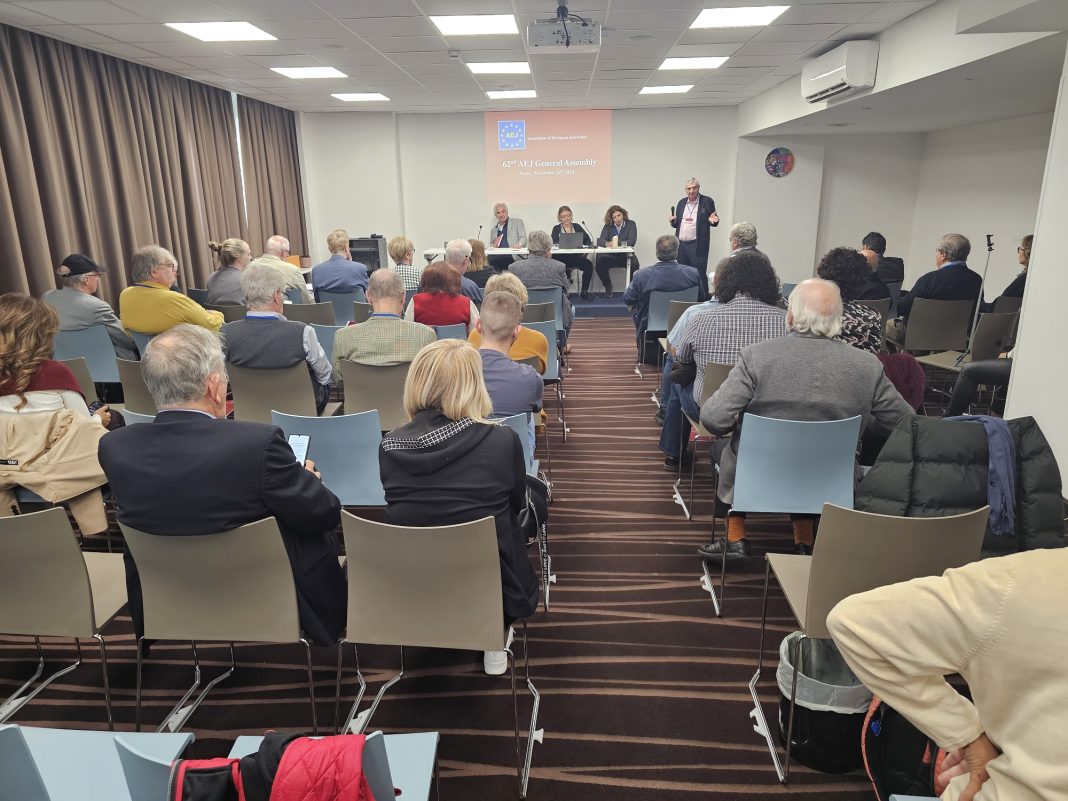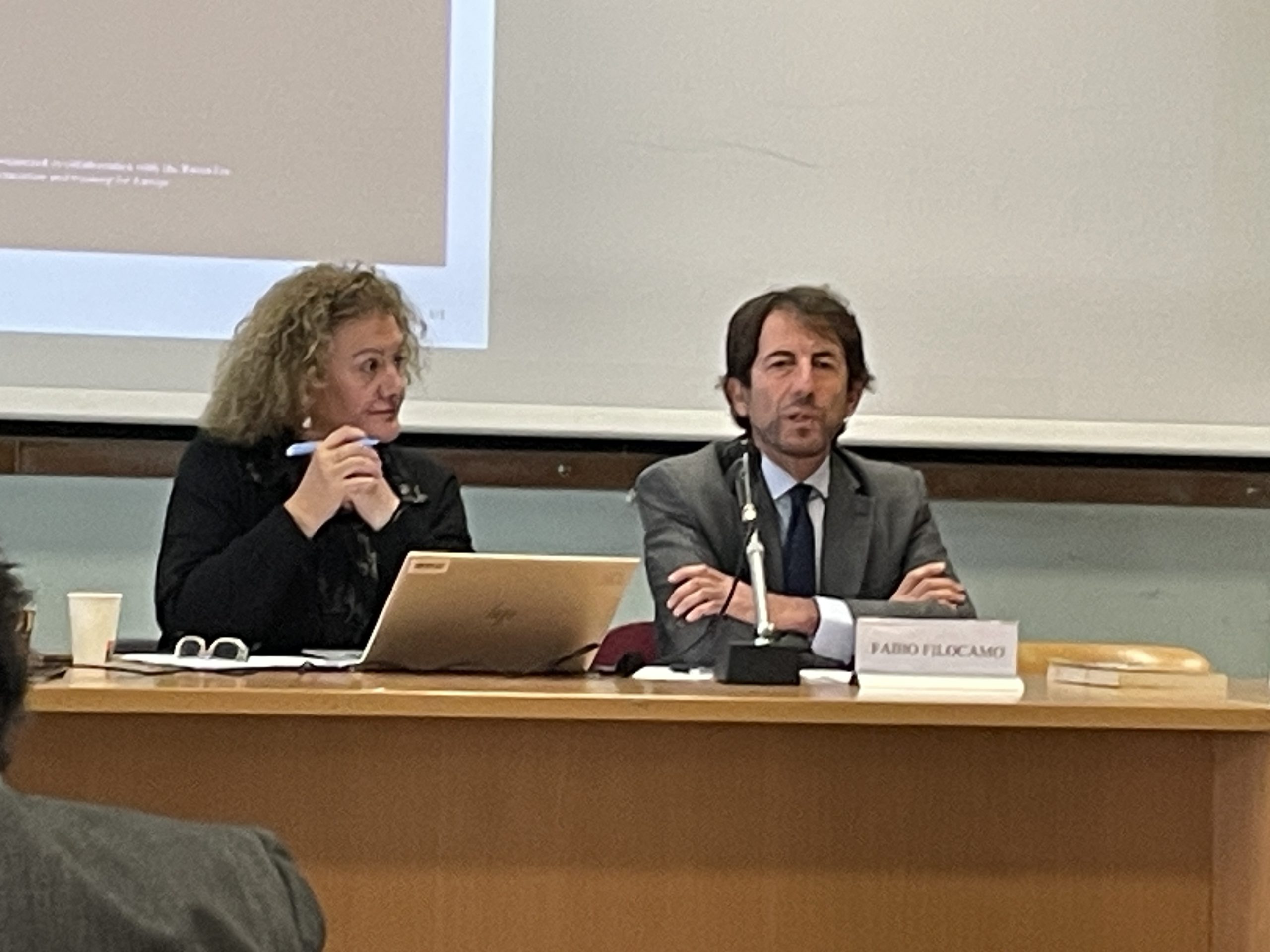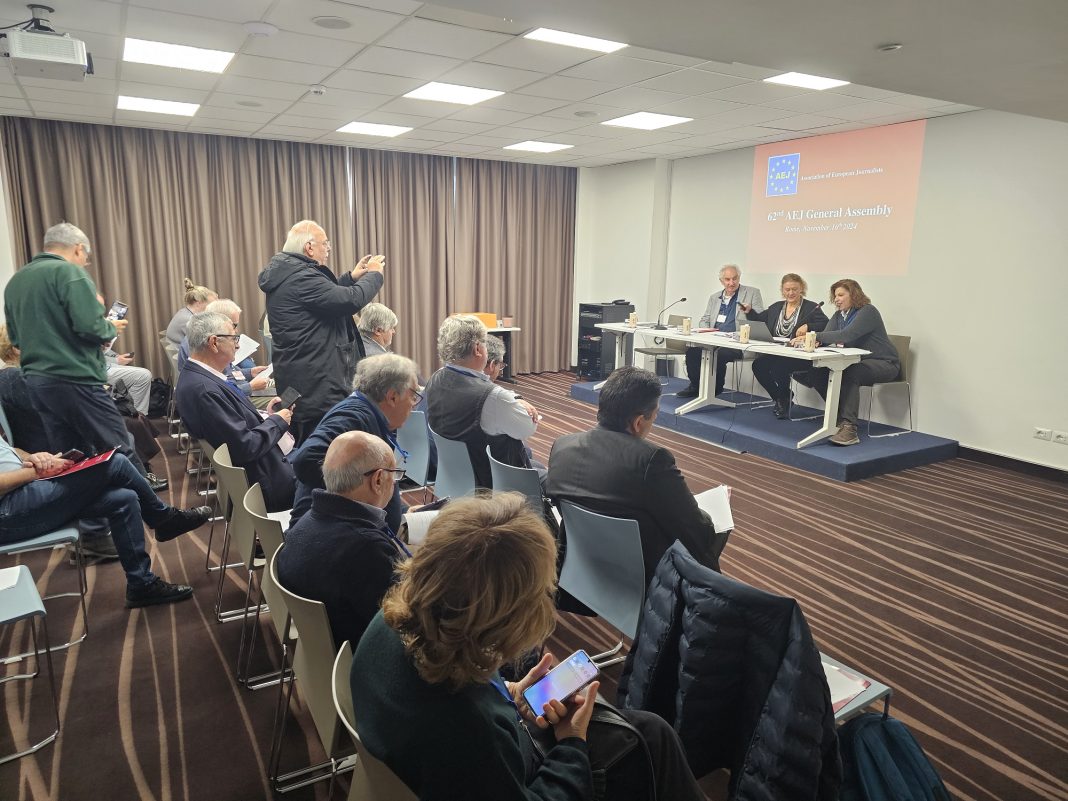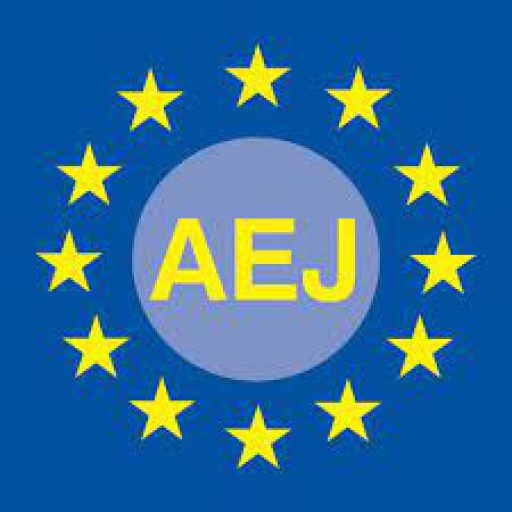From David Worsfold, AEJ UK Treasurer and delegate to the AEJ Congress
Two topics that capture the enormity of the challenges facing journalism and the media dominated the Association of European Journalists annual congress in Rome: media freedom and artificial intelligence.
The growing threats to media freedom were a recurring topic throughout the days’ presentations and debates at the Università Roma Tre on November 14-17, with sombre reminders that many journalists have suffered physical violence and lost their lives just doing their job over the last year. During AEJ-UK Chair William Horsley’s presentation, the room stood in silence to remember those journalists killed, especially in Gaza.
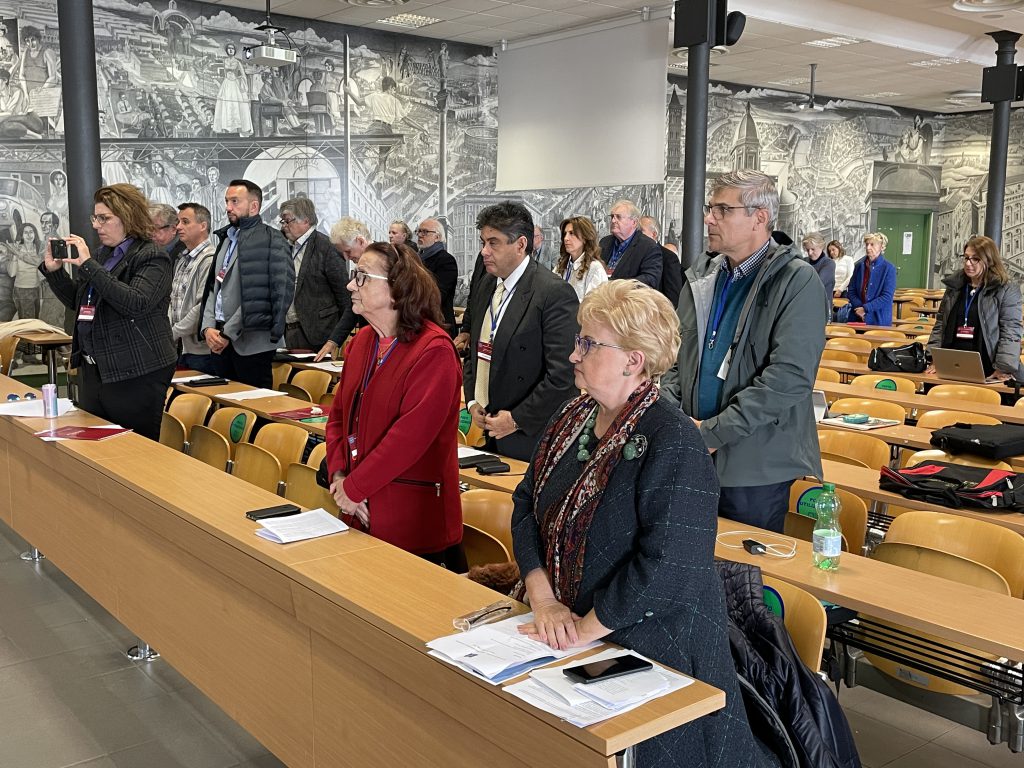
Horsley spoke about the work being done across Europe to protect press freedom, especially through the Journalists Matter campaign and the Council of Europe’s Safety of Journalists Platform. There are 1400 active alerts on the platform and it has extended its remit over the last year:
“In a new development, the alliance of press freedom organisations has published critical ‘systemic alerts’, based on careful legal analysis, highlighting serious defects in the defamation and anti-SLAPP laws, especially in Azerbaijan, Croatia, Greece, Ireland, Italy, Poland, Serbia, Turkey and the UK.”
He detailed many of the most serious issues arising across Europe and reminded the audience of the crucial role the AEJ plays in ensuring Europe’s policymakers and governments are aware of their crucial importance:
“AEJ national sections and their members can benefit greatly from the policies, mechanisms and multi-stakeholder activities that have sprung up in the past several years to protect independent journalism and the safety of journalists. We are uniquely well-placed to show our common commitment by engaging with and contributing to these various initiatives, led and co-ordinated by the Council of Europe, as well as the EU and the OSCE (Organisation for Security and Co-operation in Europe).”
In a video made for the congress, Dogan Tilic, founder and columnist of the BirGün Gazaetsi in Turkey, gave a vivid first-hand account of the increasing difficulties facing journalists and independent media as President Recep Tayyip Erdoğan tightens his grip on the media and suppresses criticism of his regime.
Rita Lofano, editor-in-chief of the Italian news agency AGI, looked beyond Europe and called the election of Donald Trump “a turning point for the media too”, pointing to the growing influence of Elon Musk and other tech billionaires on the media landscape in the United States, as well as power of the social media networks they control.
The rapidly growing capabilities of artificial intelligence are both a threat and an opportunity for journalists, said Fabio Filocamo, a columnist with Corriere della Sera. He threw out a challenge to the audience: “Could we be replaced by AI? Are our jobs going to be done by AI in the future?”
In answering the question, he suggested that some roles, perhaps for example news presenters, voice-overs and simultaneous translation could be taken over by AI, that some newsroom roles, especially deep research, could be done using the power of large language models (LLM) such as Chat GPT but that safeguards had to be put in place: “LLMs are ready to help us but are also ready to use us. We must always remember that they are self-learning. We should also be prepared to tell people that we are using AI but not in a way that manipulates you.”
He reassured everybody that there were still many important roles for professional journalists, especially ensuring that AI does not become a vehicle for misinformation, and that there were situations where “bodies still matter”, not least in conflict zones.
The main morning sessions were chaired by the AEJ’s outgoing president Isaia Tsaousidou.
In the afternoon, a panel chaired by Albania’s Arber Hitaj explored the issue of self-censorship with many speakers saying how the pressure placed on them by governments, security services and big corporations often made them fearful or reluctant to publish stories and information that rightfully belonged in the public domain.
All change at the AEJ and the international Congress
The Association of European Journalists 2024 General Assembly met in Rome on Saturday 16 November with delegates of 16 countries present or contributing their voices from their home countries.
The entire morning was spent in a difficult debate about contentious internal matters related to the AEJ’s management of its internal affairs and priorities. But over lunch, concerns about the future advocated by the association’s members (national sections) led to a compromise suggestion from this year’s Italian organisers.
An important agreement was reached by consensus among delegates representing all the sections present in Rome. The delegates agreed unanimously and exceptionally to postpone the scheduled biennial AEJ elections for a maximum of one year, and meanwhile to appoint an interim AEJ Board of six regular office-holders and two special representatives for that period. The special representatives are charged with advancing the common interests and purposes of the AEJ in the fields of media freedom and its representation to the institutions of the EU in Brussels respectively.
The interim board was given a clear and limited mandate to achieve or advance the following five key outcomes within the next twelve months:
1) Leading to a new General Assembly and elections in one year’s time
2) Preparing to amend the AEJ Statutes to meet new legal and other needs
3) Solving the problem of the Annual Fee per individual member
4) Unfreezing the AEJ Bank Account
5) Working for the unity of AEJ
In his first address to members by the incoming interim AEJ President, Arber Hitaj (Albania) warmly thanked the Italian Section for its exceptional efforts in organising the 2024 Congress and General Assembly.
He pledged on behalf of all the members that the incoming board would make a fresh, collaborative and inclusive start on behalf of the whole association, upholding high standards of transparency and journalistic professionalism. He spoke of putting aside past differences and cooperating more actively with other media and civil society partner organisations. The AEJ, he said, would draw on the youthful talents, energies and modern communications skills of members of the newly appointed interim board to strengthen the sense of common purpose, and enhance the AEJ’s constructive and purposeful relationships with the EU and other key European institutions.
The new AEJ board comprises of the following members:
PRESIDENT: Arber Hitaj (Albanian Section)
SECRETARY GENERAL: Catalin-Teodor Dogaru (Romanian Section)
VICE PRESIDENT: Irina Nedeva (Bulgarian Section)
VICE PRESIDENT: Panagiotis Sfaelos (Greek Section)
VICE PRESIDENT: Brigitte Rambossek (Austrian Section)
TREASURER: Ivan Brada (Slovak Section)
MEDIA FREEDOM REPRESENTATIVE: William Horsley (UK Section) with the assistance of the Bulgarian Section
BRUSSELS REPRESENTATIVE: Elena Kyropoulou (Greek Section)
ARBITRATION COMMITTEE
Eileen Dunne (Irish Section)
Brindusa Armanca (Romanian Section)
Javier Fernandez Arribas (Spanish Section)
Carmelo Occhino (Italian Section)
Martha Janckarova (Slovak Section)
AUDIT COMMITTEE
Tim Ryan (Irish Section)
David Worsfold (UK Section)
Javier Domingues (Spanish Section)
Vassiliki Ntoufexi (Greek Section)
Qamil Xhani (Albanian Section)
